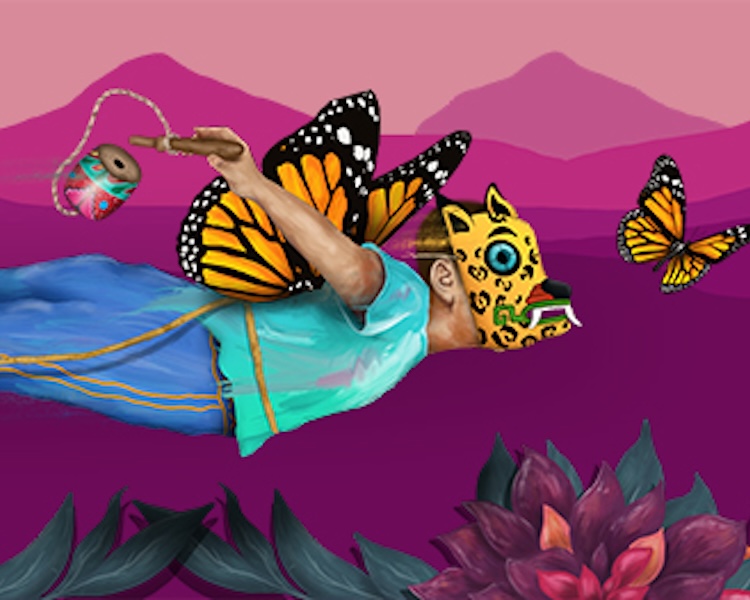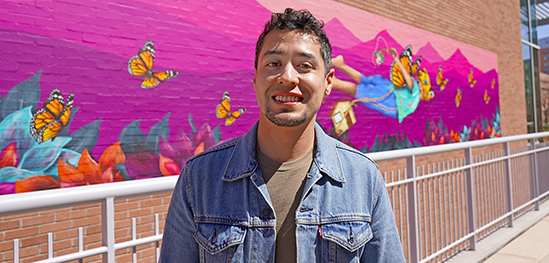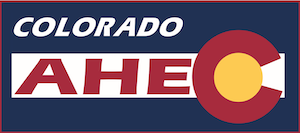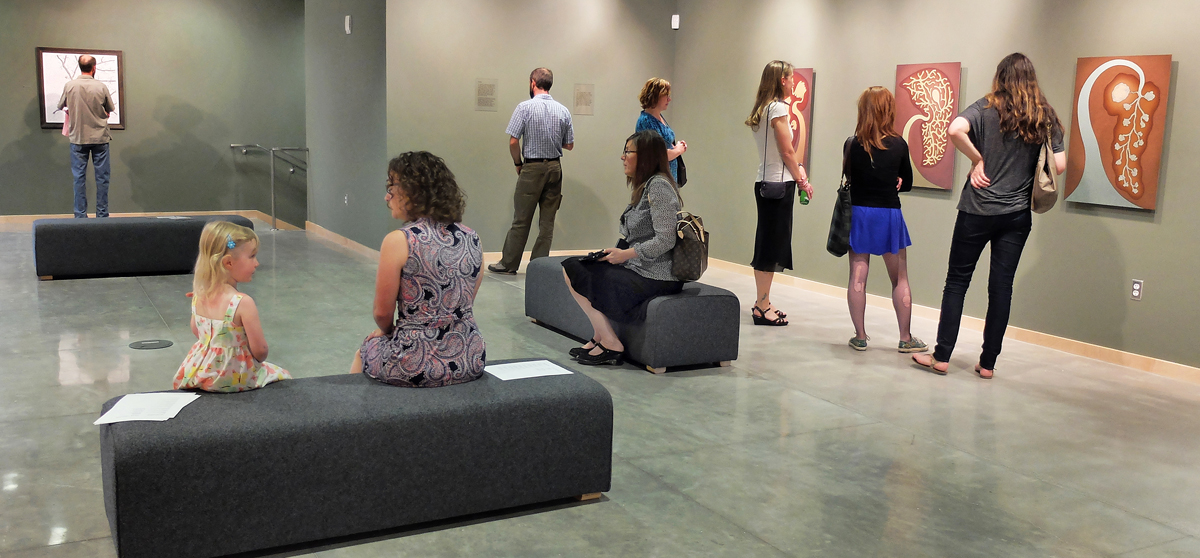FLY TO HEAL | JULS MENDOZA
Date: May 1, 2023

Fly to Heal, Mural by Juls Mendoza: Current, West Elevation of Fulginiti Pavilion: "Volar Para Sanar" celebrates the richness of living in a multi-cultural community vibrant with new Americans while recognizing challenges facing our neighbors, patients and colleagues.
Artist Statement
"My name is Julio Mendoza and I’m a Denver artist who migrated from Cd, Juarez Mexico in 2001 when I was 11 years old. We weren’t poor, we had a house, and my dad had a job in “Las maquilas,” a factory. Juarez was known for violence and the violence against women was very high. Fearing that anything will happen to my mother or my sister or any of us, my dad decided it was time for a new life and to migrate to the U.S.
"It took me several years to accept my new situation and understand we weren't going to go back to Mexico. I left my two best friends back in Juarez. When you're just a kid all you care about are your best friends and the joy of playing outside in the streets, in the dirt and on top of the house rooftops. That can never be replaced. Not to mention the cultural shock, the struggle of learning a new language and making new friends. As a child it's not easy to understand all our parents had to go through to migrate to another country, but neither is it easy for a parent to understand all a child goes through either.
"This mural represents the plight of every migrant child. The kid is on his way to a new and unknown destination, flying over dahlias which represent change and strength on this new journey. But he is not alone, he is accompanied by monarch butterflies, which are a symbol of migration. He’s not letting go of his most precious toys, his memories, or his home, “Su Hogar,” a place where you live and feel safe, calm and peaceful. The jaguar mask represents the boy’s culture but it also represents strength, ferocity, and courage. He wears this mask to try to fit in and hide his fears, feeling uncomfortable and insecure in this place where there are mountains and the people speak English."
Juls understands firsthand the trauma that some children experience during that journey. When Juls left Mexico, he lost a childhood filled with play, friendship, and adventure. Despite these losses, Juls chose to create a mural depicting a spirit of courage and hope. When asked what he wanted people to take away from his mural, Juls replied: “healing.” Juls has personally experienced the role that art can play in healing children and adults alike. We hope that Juls’ mural will inspire reflection, curiosity, and healing. Juls was selected from 96 applications in a global call for submissions.
The Center for Bioethics and the Humanities at CU Anschutz is proud to be located in Aurora, Colorado, the most diverse city in our beautiful state. One in five of our Aurora neighbors was born in another country. No wonder 160 languages are spoken in our community and we have arguably the best ethnic cuisine on the front range!
When unaccompanied children arrive to Colorado, they are highly likely to be placed in or near Aurora. Indeed, the top five counties receiving unaccompanied children in Colorado include Arapahoe, Denver, Adams, El Paso, and Weld. While we celebrate and value the richness of living in a multi-cultural community vibrant with New Americans, we also understand that there are unique challenges our neighbors, patients, clients, and colleagues face. These include higher rates of childhood trauma prior to, during, or after arrival to the United States, barriers to healthcare and other services, as well as economic insecurity.
The Fly to Heal mural by Juls Mendoza is intended to honor children arriving to the United States and to celebrate their strength and resilience. Fly to Heal is part of our 2023 Testimony programming amplifying the voices of children in migration. The artwork and events organized in the Fulginiti Pavilion this year are intended to bear witness to the shared obligations we have to respect the rights of these newly arrived children and their families. Whether providing medical services to patients, ethical consults to clients, teaching our students, or sharing arts and humanities with our community both on and off campus, we are committed to celebrating the inherent humanity that unites us all.
- The exhibit, Art as Advocacy, was on display in the Art Gallery and Lobby of the Fulginiti Pavilion through February 5, 2024.
- Web | Instagram | Share Your Thoughts
- Read the May 23 article, Fly to Heal Mural Takes Off to Amplify the Voices of Children in Migration, by Matthew Hastings in CU Anschutz News.
- Read the Denverite June 20 article, Westwood's Juls Mendoza latest mural sheds light on the experiences of migrant children.
- This mural is co-sponsored and funded by Colorado AHEC.
Volar Para Sanar: Mural de Juls Mendoza
DECLARACIÓN DEL ARTISTA: "Me llamo Julio Mendoza, y soy un artista de Denver. Emigré de Ciudad Juárez, México en 2001 cuando tenía 11 años. No éramos pobres, teníamos una casa y mi papá trabajaba en “Las maquilas”, una fábrica. Juárez era conocido por la violencia y había mucha violencia contra las mujeres. Temiendo que algo le pasara a mi madre, a mi hermana o a cualquiera de nosotros, mi padre decidió que ya era la hora para empezar una nueva vida y emigramos a los EE. UU.
"Necesité varios años para aceptar mi nueva situación y entender que no íbamos a volver a México. Dejé a mis dos mejores amigos en Juárez. Cuando eres niño la única cosa que te importa son tus mejores amigos y la alegría de jugar en las calles, en la tierra y en las azoteas de las casas. Eso nunca puede ser reemplazado. Además enfrentaba el choque cultural y el reto de aprender un nuevo idioma y hacer nuevos amigos. De niño no es fácil entender todo lo que enfrentaron nuestros padres para migrar a otro país, pero tampoco es fácil para un padre entender todo lo que enfrenta su hijo. "Este mural representa la situación difícil de cada niño migrante. El niño se dirige a un nuevo y desconocido destino, volando sobre las dalias que representan el cambio y la fuerza en este nuevo viaje. Pero no está solo, lo acompañan las mariposas monarca, las cuales son símbolo de la migración. No va a soltar sus juguetes más preciosos, sus recuerdos ni su hogar, “Su Hogar”, un lugar donde vives y te sientes seguro, tranquilo y en paz.
"Este mural representa la situación difícil de cada niño migrante. El niño se dirige a un nuevo y desconocido destino, volando sobre las dalias que representan el cambio y la fuerza en este nuevo viaje. Pero no está solo, lo acompañan las mariposas monarca, las cuales son símbolo de la migración. No va a soltar sus juguetes más preciosos, sus recuerdos ni su hogar, “Su Hogar”, un lugar donde vives y te sientes seguro, tranquilo y en paz.
"La máscara de jaguar representa la cultura del niño pero también representa fuerza, ferocidad y valor. Usa esta máscara para tratar de encajar y esconder sus miedos, sintiéndose incómodo e inseguro en este lugar donde hay montañas y la gente habla inglés."
Jules comprende de primera mano el trauma que experimentan algunos niños durante este viaje. Cuando Juls se fue de México, perdió una infancia llena de juegos, amistad y aventuras. A pesar de estas pérdidas, Juls decidió crear un mural que representa un espíritu de valor y esperanza. Cuando se le preguntó qué quería que la gente se llevara de su mural, Juls respondió: "curación". Juls ha experimentado personalmente el papel que el arte puede desempeñar en la curación de niños y adultos igualmente. Esperamos que el mural de Juls inspire reflexión, curiosidad y sanación. Juls fue seleccionado entre 96 solicitudes en una convocatoria mundial de presentaciones.
El Centro de Bioética y Humanidades de CU Anschutz se enorgullece de estar ubicado en Aurora, Colorado, la ciudad más diversa de nuestro hermoso estado. Uno de cada cinco de nuestros vecinos de Aurora nació en otro país. ¡Con razón se hablan 160 idiomas en nuestra comunidad y posiblemente tengamos la mejor cocina étnica en el frente!
Cuando los niños no acompañados llegan a Colorado, es muy probable que sean colocados en o cerca de Aurora. De hecho, los cinco principales condados que reciben niños no acompañados en Colorado incluyen Arapahoe, Denver, Adams, El Paso y Weld. Si bien celebramos y valoramos la riqueza de vivir en una comunidad multicultural llena de nuevos estadounidenses, también entendemos que existen desafíos únicos que enfrentan nuestros vecinos, pacientes, clientes y colegas. Estos incluyen tasas más altas de trauma infantil antes, durante o después de la llegada a los Estados Unidos, barreras para la atención médica y otros servicios, así como la inseguridad económica.
El mural Fly to Heal de Juls Mendoza tiene como objetivo honrar a los niños que llegan a los Estados Unidos y celebrar su fortaleza y resiliencia. Fly to Heal es parte de nuestra programación Testimonio 2023 que amplifica las voces de los niños en la migración. Las obras de arte y los eventos organizados en el Pabellón Fulginiti este año pretenden dar testimonio de las obligaciones compartidas que tenemos de respetar los derechos de estos niños recién llegados y sus familias. Ya sea brindando servicios médicos a pacientes, consultas éticas a clientes, enseñando a nuestros estudiantes o compartiendo artes y humanidades con nuestra comunidad tanto dentro como fuera del campus, estamos comprometidos a celebrar la humanidad inherente que nos une a todos.
- La exposición, El arte como defensa, se exhibe en la Galería de arte y el vestíbulo del Pabellón Fulginiti hasta el 5 de febrero de 2024.
- Web | Instagram | Comparte sus pensamientos
- Lea el artículo del 23 de mayo, Fly to Heal Mural Takes Off to Amplify the Voices of Children in Migration, de Matthew Hastings en CU Anschutz News.
- Lea el artículo del 20 de junio de Denveriteel último mural de Juls Mendoza de Westwood arroja luz sobre las experiencias de los niños migrantes.
- Video: Plática de la primera noche de la exposición el 12 de junio de 2023 con el académico, abogado y defensor internacional de los derechos del niño Warren Binford, JD, Ed.M, Gerente del Programa de Murales de AHEC, Frank Garza, el artista Juls Mendoza y la curadora Sara Fischer.
- Este mural está copatrocinado y financiado por Colorado AHEC.

 Hours
Hours